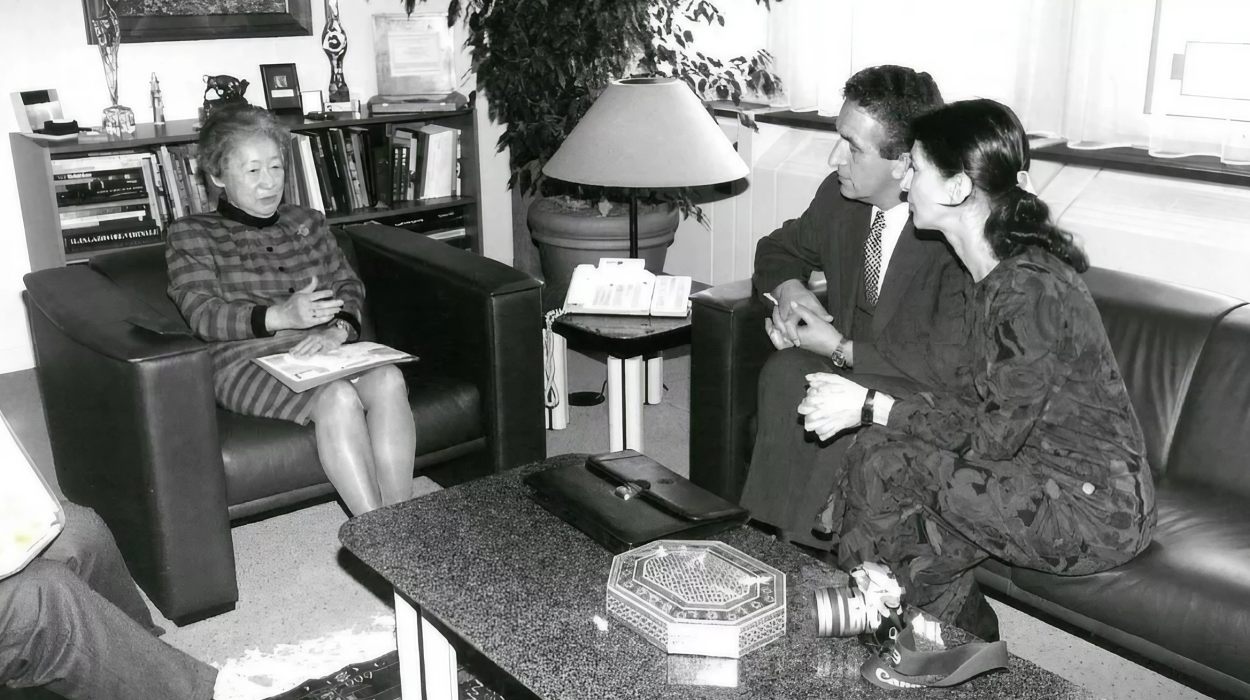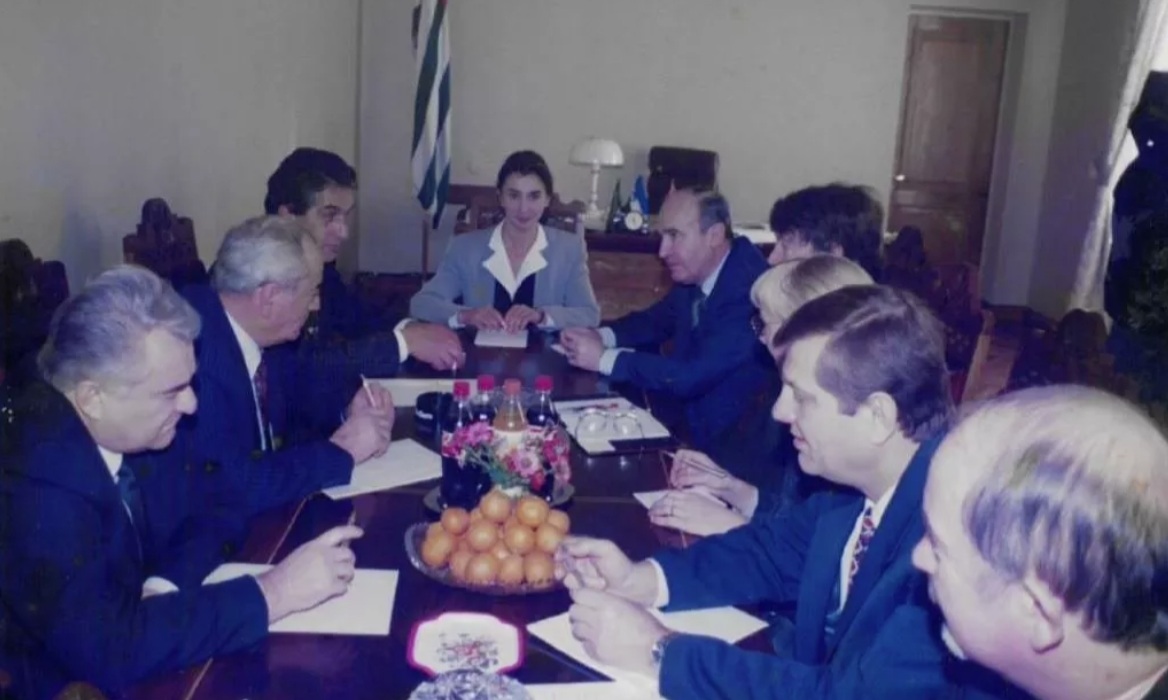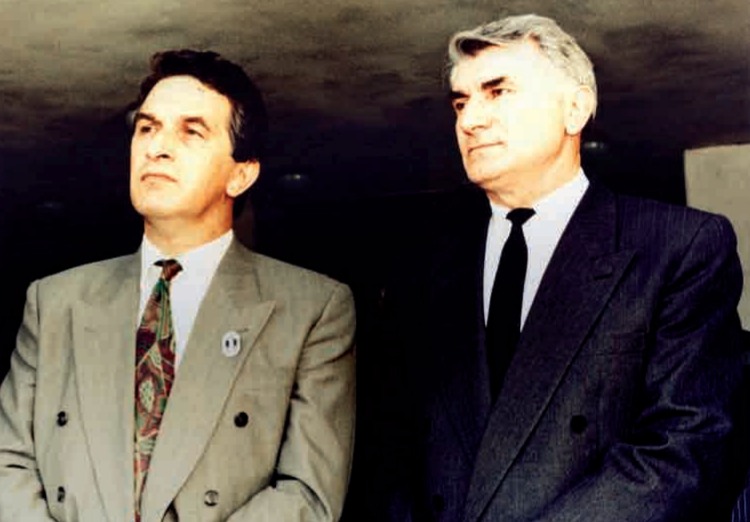The Leader of the Nation and Father of Victory: Memories of Vladislav Ardzinba

Vladislav Ardzinba (14 May 1945 – 4 March 2010) was a wartime leader and the first president of Abkhazia.
SUKHUM / AQW'A ― On 14 May 1945, Vladislav Ardzinba, the first president of Abkhazia, was born; today he would have turned 79. Those who worked with him recall the kind of person he was.
“There are many presidents in the world, but few leaders. And you are the true leader of your nation,” remarked Turkish Ambassador Burak Gursel, wisely and subtly describing Vladislav Ardzinba.
Ardzinba was instrumental in the establishment of the modern Abkhazian state. His name is synonymous with the freedom and independence of Abkhazia for the republic's inhabitants.
Interpreter Anna Keropyan often quotes the famous poet Joseph Brodsky when speaking about the first president: "As long as a person is ready to give his life for his ideals, these ideals are alive, civilisation is alive." She asserts that Ardzinba’s dedication was evident even in everyday routine work.
"He truly sacrificed himself; he did it consciously. He loved Abkhazia and its people so much that he could not imagine himself outside this space. I attended all his international meetings and witnessed how each one demanded a huge amount of energy, as he used all his powers to convey the truth about Abkhazia, against which almost the whole world stood at that time," recalls Keropyan.

Meeting with UN High Commissioner for Refugees Sadako Ogata in Geneva 1997. © Photo: Anna Keropyan
After the Patriotic War of the people of Abkhazia (Georgian-Abkhazian War of 1992-1993), negotiations began in Geneva between the conflicting parties in the presence of international observers. During these negotiations, Vladislav Ardzinba frequently referred to history, which his opponents found irksome.
"Diplomats would sometimes say: ‘Must you always direct us to history, to the distant past? Let's discuss today.’ But he would reply: ‘Without knowing the past, we will never understand the present.’ One diplomat even complained of a headache brought on by our history. Ardzinba responded, ‘If you, a diplomat, have a headache from history, perhaps you are in the wrong job,’" Keropian recalls with a smile.
During Ardzinba's leadership, Abkhazia's foreign policy was precarious—no country in the world recognised its independence. However, as the small country proudly stood against global opposition, even Ardzinba's adversaries acknowledged his leadership, immense intellect, and fortitude.

Meeting with a group of Friends of the UN Secretary General 1996.
+ Anna and the President: A Translator's Story
+ 14 August 1997, Vladislav Ardzinba - in Tbilisi. How did this come about?
+ Vladislav Ardzinba: Historian who became the first President of Abkhazia
+ Photo Album: Vladislav Ardzinba
He Was a Devotee of Abkhazia
Otar Adleiba, who worked for Ardzinba for 11 years as a driver, recalled his first president as a man who wholeheartedly supported his people.
Otar began working with Vladislav Ardzinba in 1997, after the war. Even then, Ardzinba never stopped checking the daily reports of the Ministry of Internal Affairs.
"In the morning, he could be in a good mood, but as soon as he heard bad news, the smile immediately left his face. He took everything related to Abkhazia and its people very much to heart. One morning, secretary Raisa Nikolaevna brought the summaries from the Ministry of Internal Affairs. She placed the bulletin on Ardzinba's desk and immediately ran for a validol. I looked at the paper and saw that the 'forest brothers' [a terrorist group of killers and saboteurs based in Georgia’s neighbouring province of Mingrelia – ed.] had killed 15 people. He took this news very painfully. That was his nature," recalls Adleiba.

Vladislav Ardzinba at the funeral of Mushni Khvartskiya, Gudauta, December 1992.
The driver knew Vladislav Ardzinba so well that he could even distinguish his mood by the movement of his eyebrows. If Ardzinba was in a bad mood, the driver and bodyguards remained silent. But when the president was in good spirits, they joked and told anecdotes. Often, Ardzinba himself liked to joke with them.
Even when the president was upset and agitated, he quickly calmed down.
"Once our car broke down, and then we went to a funeral.
"'I can't push your car,' he said, got out, and moved to another vehicle.
"We drove silently the whole way. The next day, he told his wife:
"'Do you know why there’s a car driving behind?'
"'Of course, it's security,' she replied.
"'No, it’s so that I can move into it if this car breaks down,' he added with a smile.
"He knew how to joke. He seemed to possess the power of hypnosis. He had an amazing ability to win people over," Adleiba recalls.
President of the Abkhaz-Adyghe People
Vladislav Ardzinba was a recognised leader not only in his homeland but also abroad.
“Once, we went to Adyghea for the anniversary of Aslan Dzharimov (the first president of Adyghea). We arrived late. Vladislav Ardzinba changed his clothes at the hotel and immediately went to the stadium where the Caucasus World festival was held. When he arrived, they announced his presence. At that moment, all five thousand guests instantly stood up and began to applaud him," recounted Otar Adleiba.
“And when the first president of Adyghea, Aslan Dzharimov, introduced the leader of Abkhazia, he emphasised: ‘Today we have the president of the Adyghe-Abkhazian people, the president of Abkhazia, Vladislav Ardzinba.’

Vladislav Ardzinba and Aslan Dzharimov
“The stadium rose again and began to applaud. He was loved not only in Abkhazia but also abroad,” the driver recalled. “I saw him every day, talked to him every day, but it seemed to us that he was not like any of us; it was as if he was from another planet. We all looked upon him as a deity, the source of hope. He really was a god to all of us.
“His destiny was a difficult one – leading Abkhazia during its most challenging period."
Most of all, Otar Adleiba remembered Ardzinba’s last trip to Moscow in March 2010.
“The plane arrived at Babushera Airport. I stood up and said: ‘Vladislav Ardzinba, today it falls to us to help you board this plane, but God grant that, when you return, you will be able to come down the ramp yourself.’ But on 4 March, we learned of his death. Nature wept that day – it rained, but people walked and walked to meet the plane carrying the coffin of Vladislav Ardzinba. People stood on the road and cried," Adleiba added.
Vladislav Ardzinba was born on 14 May 1945, in the village of Eshera in the Sukhum district. Ardzinba defended his candidate's dissertation in 1971 and became a Doctor of Historical Sciences in 1985. He headed the Ideology and Culture of the Ancient East sector at the Institute of Oriental Studies of the Academy of Sciences of the USSR and authored more than 40 scientific works. His career spanned both academia and politics, serving as the director of the Abkhazian Research Institute from 1988 to 1996, a Deputy of the Supreme Soviet of Abkhazia in 1989, and later as a USSR People's Deputy and a Deputy of the USSR Supreme Soviet in the same year. He chaired the Supreme Soviet of Abkhazia in 1990.
Entering the political arena in the late 1980s, Ardzinba played a pivotal role in the history of his nation. His leadership in the national liberation struggle led to Abkhazia achieving its independence. Ardzinba's significant contributions to his country were recognised with his election as president of Abkhazia for two consecutive terms, from 1994 to 1999 and 1999 to 2004.
Ardzinba passed away on 4 March 2010, after battling a prolonged illness. His legacy as a scholar and leader continues to inspire the people of Abkhazia.